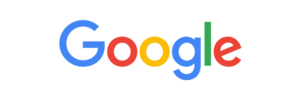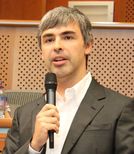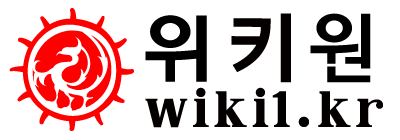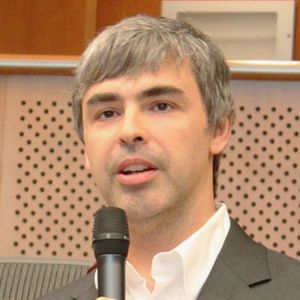래리 페이지

래리 페이지(Larry Page)는 미국 구글(Google)의 공동 창업자 겸 CEO이다. 1998년 세르게이 브린(Sergey Brin)과 함께 구글을 창립했다. 2015년 8월 새로운 지주회사인 알파벳(Alphabet Inc.)을 설립하여 2015년 10월부터 현재 알파벳의 CEO로 활동 중이다.
목차
약력
- 1991년 이스트 랜싱 고등학교 졸업
- 1996년 8월 구글 초기 버전 발표
- 1998년 구글 설립
- 2011년 4월 구글 CEO
- 2015년 7월 알파벳(Alphabet) CEO
수상
- 1998년 PC Magazine Top 100 웹 사이트 및 검색 엔진으로 선정
- 1999년 웹 응용 프로그램 개발 분야 혁신 기술 우수상
- 2000년 People's Voice Award "Webby Award" 수상
- 2002년 세계경제포럼 내일을 위한 글로벌 리더
- 2002년 메사추세츠 공과 대학(MIT) "35세 이하 세계 100대 혁신가 중 한 명"
- 2003년 IE 비지니스스쿨 경영학 석사(MBA)
- 2004년 마르코니 상 수상 및 콜롬비아대학의 마르코니 펠로우로 선출
- 2004년 X Prize 이사회의 수탁자로 선정 및 National Engineering Academy에 선출
- 2005년 the American Academy of Arts and Sciences 펠로우로 선출
- 2008년 the Princess of Asturias Awards "Communication Award" 수상
- 2009년 미시간대학 명예 박사 학위
- 2015년 포브스 '미국의 가장 인기 있는 최고 경영자' 1위
- 2017년 Italy Agrigento 명예 시민권 수여
생애
1973년 미국 미시건주에서 유대인 부모 밑에서 태어났다. 아버지는 미시건주립대학교 컴퓨터공학과 교수였고, 어머니는 같은 대학교 컴퓨터 강사였다. 부모님의 영향으로 6살 때부터 컴퓨터에 관심을 갖기 시작했으며, 미시건대학교에 진학하여 컴퓨터를 전공했다.
교수가 되고자 스탠퍼드 대학교(Stanford University) 대학원에 진학하여 같은 유대인이자 동갑인 세르게이 브린(Sergey Brin)을 만났다. 대학원 친구였던 페이지와 브린은 당시 막 태동한 월드와이드웹(WWW) 서비스에 관심을 가지고, 방대한 웹사이트에서 원하는 정보를 검색하는 알고리즘을 개발했다. 이 알고리즘에 대해 페이지는 자신의 이름을 따서 페이지랭크(PageRank)라고 이름을 붙였으며, 이 알고리즘을 사용하는 검색엔진에 대해 백럽(BackRub)이라는 이름을 붙였으나, 이후 10100, 즉 10의 100승을 의미하는 구골(Googol)과 발음이 비슷한 구글(Google)로 이름을 변경했다.
당시 23세의 젊은이들이었던 두 사람은 회사 경영에 부담을 느끼고, 구글 검색엔진을 야후(Yahoo)와 알타비스타(Altavista) 등에 매각하려고 하였으나 협상이 결렬되었다. 다행히 썬 마이크로시스템즈(SUN Microsystems)의 창업자인 앤디 벡톨샤임(Andy Bechtolsheim)의 투자를 받아 독자 회사를 세우기로 하였다.
1998년 9월 구글 회사를 설립하고, 래리 페이지가 대표이사(CEO)를 맡고, 세르게이 브린이 사장(President)을 맡았다. 이후 구글은 아마존(Amazon) 창업자인 제프 베조스(Jeff Bezos) 등 3명으로부터 엔젤투자를 받았으며, 뛰어난 검색 기능과 광고를 통한 수익을 통해 폭발적으로 성장했다.
회사의 규모가 커짐에 따라 당시 28세의 청년이었던 래리 페이지와 세르게이 브린은 경영에 부담을 느끼고, 전문 경영인 제도를 도입하기로 하고, 2001년 에릭 슈미트(Eric Schmidt)를 구글의 대표이사(CEO)로 영입했다. 2004년 8월 구글이 기업공개(IPO)를 통해 미국 나스낙(NASDAQ)에 상장하면서, 구글의 주식 지분 약 16%를 소유한 래리 페이지는 세계적인 부호 순위에 이름을 올렸다.
래리 페이지는 신경 손상으로 인한 성대 마비가 있어서, 대중 앞에서 오랫동안 말을 하기 어려웠다. 그로 인해 회사의 공식 발표는 대부분 CEO인 에릭 슈미트가 진행했으며, 래리 페이지는 은둔형 경영자로 불리게 되었다.
2005년 래리 페이지는 앤디 루빈(Andy Rubin)을 만나 안드로이드(Android) 운영체제를 개발한 안드로이드사를 인수했고, 2006년 주식교환 방식으로 유튜브(YouTube)를 인수했다.
2011년 38세가 된 래리 페이지는 구글 대표이사(CEO)를 맡아 직접 회사를 이끌었다. 회장으로 물러난 에릭 슈미트는 래리 페이지에 대해 “더 이상 보호자가 필요 없다”라고 썼다. 2015년 알파벳(Alphabet)이라는 지주회사를 설립하고 구글 등을 자회사로 편입시켰다.

1998–2001
창립
1998 년, 래리 페이지와 세르게이 브린은 초기 도메인 이름이 "Googol"인 구글(Google Inc.)을 창립 했다. 처음에 래리 페이지는 CEO로 임명되었으며, 구글의 공동 창업자인 세르게 브린은 구글의 사장을 역임하였다. 래리 페이지와 세르게이 브린의 사명은 "전 세계 정보를 체계화하여 보편적으로 접근 가능하고 유용하게 만드는 것"이었다.
친구와 가족으로부터 100만 달러를 빌려 2000년 초 Mountain View 사무실로 창단했다. 1999년에 래리 페이지는 구글이 서버를 위해 빌렸던 제 3자 창고의 각 제곱미터에 더 많은 것을 넣을 수 있도록 작은 서버들로 실험을 했다. 이것은 결국 그 당시 구글의 경쟁자들보다 훨씬 더 빠른 검색엔진으로 이어졌다. 2000년 6월까지 구글은 약 10억 개의 인터넷 URL을 색인화하여 그 당시 웹상에서 가장 포괄적인 검색엔진이 되었다.
초기 관리 스타일
래리 페이지는 상당히 독특한 성격의 소유자로, 비엔지니어가 엔지니어를 관리하면 안 된다는 생각으로 매니저를 전부 해고하려 시도가 있었다. 구글의 고유한 기업문화 상당 부분은 래리 페이지의 철학에 기반하고 있다. 래리 페이지는 심지어 그의 팀이 경영학 교리를 참고 자료로 사용하는 것을 문서화했다. 사용자에게 초점을 맞추면 나머지는 저절로 따라온다.
- 위임하지 마라. 직접 할 수있는 모든 일을 하라.
- 가치가 없다면 방해하지 마라. 당신이 다른 일을하는 동안 사람들이 실제로 일을하면서 서로 이야기 하게 해라.
- 꼰대가 되지 마라 .
- 아이디어는 나이를 따지지 않는다. 누군가가 중학생이라고해서 그것이 존중과 협력을받을 자격이 없다는 것을 의미하지는 않는다.
- 당신이 할 수 있는 가장 나쁜 일은 누군가가 "아니오."라고 말함으로써 무언가를 멈추게 하는 것이다. 당신이 아니오라고 말하면, 당신은 그들이 그것을 끝내는 더 좋은 방법을 찾도록 도와야한다.
래리 페이지의 새로운 모델은 지속적이지 않았으며 영향을 받은 직원들 사이에 불만을 갖게 했음에도 불구하고 비엔지니어가 엔지니어를 관리하는 문제는 보다 광범위하게 영향을 미쳤습니다. 결국 엔지니어 팀의 관리 역할에 엔지니어 만 배치하는 관행이 실리콘 밸리 전역의 표준으로 확립되다.
2001–2011
Changes in management and expansion
Before Silicon Valley's two most prominent investors, Kleiner Perkins Caufield & Byers and Sequoia Capital, agreed to invest a combined total of $50 million in Google, they applied pressure on Page to step down as CEO so that a more experienced leader could build a "world-class management team." Page eventually became amenable to the idea after meeting with other technology CEOs, including Steve Jobs and Intel's Andrew Grove. Eric Schmidt, who had been hired as Chairman of Google in March 2001, left his full-time position as the CEO of Novell to take the same role at Google in August of the same year, and Page moved aside to assume the President of Products role.[1]
Under Schmidt's leadership, Google underwent a period of major growth and expansion, which included its initial public offering (IPO) on August 20, 2004. He always acted in consultation with Page and Brin when he embarked on initiatives such as the hiring of an executive team and the creation of a sales force management system. Page remained the boss at Google in the eyes of the employees, as he gave final approval on all new hires, and it was Page who provided the signature for the IPO, the latter making him a billionaire at the age of 30.[1]
Page led the acquisition of Android for $50 million in 2005 to fulfill his ambition to place handheld computers in the possession of consumers so that they could access Google anywhere. The purchase was made without Schmidt's knowledge, but the CEO was not perturbed by the relatively small acquisition. Page became passionate about Android, and spent large amounts of time with Android CEO and cofounder Andy Rubin. By September 2008, T-Mobile launched the G1, the first phone using Android software and, by 2010, 17.2% of the handset market consisted of Android sales, overtaking Apple for the first time. Android became the world's most popular mobile operating system shortly afterward.[1]
Assumption of CEO position at Google
Following a January 2011 announcement,[2] Page officially became the chief executive of Google on April 4, 2011, while Schmidt stepped down to become executive chairman.[3] By this time, Google had over $180 billion market capitalization and more than 24,000 employees.[4]
After Schmidt announced the end of his tenure as CEO on January 20, 2011, he jokingly tweeted on Twitter: "Adult-supervision no longer needed." Quartz organizational management reporter, Max Nisen, described the decade prior to Page's second appointment as Google's CEO as his "lost decade." While Page continued to exert a significant influence at Google during this time, overseeing product development and other operations, he became increasingly disconnected and less responsive over time.[1][5]
2011–2013
As Google's new CEO, Page's two key goals were the development of greater autonomy for the executives overseeing the most important divisions, and higher levels of collaboration, communication and unity among the teams. Page also formed what the media called the "L-Team," a group of senior vice-presidents who reported directly to him and worked in close proximity to his office for a portion of the working week.[6] Additionally, he reorganized the company's senior management, placing a CEO-like manager at the top of Google's most important product divisions, including YouTube, AdWords, and Google Search.[1]
In accordance with a more cohesive team environment, Page declared a new "zero tolerance for fighting" policy that contrasted with his approach during the early days of Google, when he would use his harsh and intense arguments with Brin as an exemplar for senior management. Page had changed his thinking during his time away from the CEO role, as he eventually arrived at the conclusion that his greatly ambitious goals required a harmonious team dynamic. As part of Page's collaborative rejuvenation process, Google's products and applications were consolidated and underwent an aesthetic overhaul.[5][7]
Changes and consolidation process
At least 70 of Google's products, features and services were eventually shut down by March 2013, while the appearance and nature of the remaining ones were unified.[8][9] Jon Wiley, lead designer of Google Search at the time, codenamed Page's redesign overhaul, which officially commenced on April 4, 2011, "Project Kennedy," based on Page's use of the term "moonshots" to describe ambitious projects in a January 2013 Wired interview.[7][10] An initiative named "Kanna" previously attempted to create a uniform design aesthetic for Google's range of products, but it was too difficult at that point in the company's history for one team to drive such change. Matias Duarte, senior director of the Android user experience at the time that "Kennedy" started, explained in 2013 that "Google passionately cares about design." Page proceeded to consult with the Google Creative Lab design team, based in New York City, to find an answer to his question of what a "cohesive vision" of Google might look like.[7]
The eventual results of "Kennedy," which were progressively rolled out from June 2011 until January 2013, were described by The Verge technology publication as focused upon "refinement, white space, cleanliness, elasticity, usefulness, and most of all simplicity." The final products were aligned with Page's aim for a consistent suite of products that can "move fast," and "Kennedy" was called a "design revolution" by Duarte. Page's "UXA" (user/graphics interface) design team then emerged from the "Kennedy" project, tasked with "designing and developing a true UI framework that transforms Google's application software into a beautiful, mature, accessible and consistent platform for its users." Unspoken of in public, the small UXA unit was designed to ensure that "Kennedy" became an "institution."[7]
Acquisition strategy and new products
When acquiring products and companies for Google, Page asked whether the business acquisition passed the toothbrush test as an initial qualifier, asking the question "Is it something you will use once or twice a day, and does it make your life better?". This approach looked for usefulness above profitability, and long-term potential over near-term financial gain, which has been noted as rare in business acquiring processes.[11][12][13]
With Facebook's influence rapidly expanding during the start of Page's second tenure, he finally responded to the intensive competition with Google's own social network, Google+, in mid-2011. After several delays, the social network was released through a very limited field test and was led by Vic Gundotra, Google's then senior vice president of social.[14]
In August 2011, Page announced that Google would spend $12.5 billion to acquire Motorola Mobility.[15] The purchase was primarily motivated by Google's need to secure patents to protect Android from lawsuits by companies including Apple Inc.[1] Page wrote on Google's official blog on August 15, 2011 that "companies including Microsoft and Apple are banding together in anti-competitive patent attacks on Android. The United States Department of Justice had to intervene in the results of one recent patent auction to "protect competition and innovation in the open source software community"... Our acquisition of Motorola will increase competition by strengthening Google's patent portfolio, which will enable us to better protect Android from anti-competitive threats from Microsoft, Apple and other companies".[16][17]
Page also ventured into hardware and Google unveiled the Chromebook in May 2012. The hardware product was a laptop that ran on a Google operating system, Chrome OS.[18]
2013–2015
In January 2013, Page participated in a rare interview with Wired, in which writer Steven Levy discussed Page's "10X" mentality—Google employees are expected to create products and services that are at least 10 times better than those of its competitors—in the introductory blurb. Astro Teller, the head of Google X, explained to Levy that 10X is "just core to who he [Page] is," while Page's "focus is on where the next 10X will come from."[10] In his interview with Levy, Page referred to the success of YouTube and Android as examples of "crazy" ideas that investors were not initially interested in, saying: "If you're not doing some things that are crazy, then you're doing the wrong things."[10] Page also stated that he was "very happy" with the status of Google+, and discussed concerns over the Internet in relation to the SOPA bill and an International Telecommunication Union proposal that had been recently introduced:
... I do think the Internet's under much greater attack than it has been in the past. Governments are now afraid of the Internet because of the Middle East stuff, and so they're a little more willing to listen to what I see as a lot of commercial interests that just want to make money by restricting people's freedoms. But they've also seen a tremendous user reaction, like the backlash against SOPA. I think that governments fight users' freedoms at their own peril.[10]
At the May 2013 I/O developers conference in San Francisco, Page delivered a keynote address and said that "We're at maybe 1% of what is possible. Despite the faster change, we're still moving slow relative to the opportunities we have. I think a lot of that is because of the negativity ... Every story I read is Google vs someone else. That's boring. We should be focusing on building the things that don't exist" and that he was "sad the Web isn't advancing as fast as it should be" citing a perceived focus on negativity and zero sum games among some in the technology sector as a cause for that.[19] In response to an audience question, Page noted an issue that Google had been experiencing with Microsoft, whereby the latter made its Outlook program interoperable with Google, but did not allow for backward compatibility—he referred to Microsoft's practice as "milking off." During the question-and-answer section of his keynote, Page expressed interest in Burning Man, which Brin had previously praised—it was a motivating factor for the latter during Schmidt's hiring process, as Brin liked that Schmidt had attended the week-long annual event.[1][20][21]
In September 2013, Page launched the independent Calico initiative, a R&D project in the field of biotechnology. Google announced that Calico seeks to innovate and make improvements in the field of human health, and appointed Art Levinson, chairman of Apple's board and former CEO of Genentech, to be the new division's CEO. Page's official statement read: "Illness and aging affect all our families. With some longer term, moonshot thinking around healthcare and biotechnology, I believe we can improve millions of lives."[22]
Page participated in a March 2014 TedX conference that was held in Vancouver, British Columbia, Canada. The presentation was scripted by Page's chief PR executive Rachel Whetstone, and Google's CMO Lorraine Twohill, and a demonstration of an artificially intelligent computer program was displayed on a large screen.[1] Page responded to a question about corporations, noting that corporations largely get a "bad rap", which he stated was because they were probably doing the same incremental things they were doing "50 or 20 years ago". He went on to juxtapose that kind of incremental approach to his vision of Google counteracting calcification through driving technology innovation at a high rate. Page mentioned Elon Musk and SpaceX:
He [Musk] wants to go to Mars to back up humanity. That's a worthy goal. We have a lot of employees at Google who've become pretty wealthy. You're working because you want to change the world and make it better ... I'd like for us to help out more than we are.[23]
Page also mentioned Nikola Tesla with regard to invention and commercialization:
Invention is not enough. [Nikola] Tesla invented the electric power we use, but he struggled to get it out to people. [You have to] combine both things ... invention and innovation focus, plus ... a company that can really commercialize things and get them to people.[24]
Page announced a major management restructure in October 2014 so that he would no longer need to be responsible for day-to-day product-related decision making. In a memo, Page said that Google's core businesses would be able to progress in a typical manner, while he could focus on the next generation of ambitious projects, including Google X initiatives; access and energy, including Google Fiber; smart-home automation through Nest Labs; and biotechnology innovations under Calico.[25] Page maintained that he would continue as the unofficial "chief product officer."[9] Subsequent to the announcement, the executives in charge of Google's core products reported to then Google Senior Vice President Sundar Pichai, who reported directly to Page.[25][26][27][28]
In a November 2014 interview, Page stated that he prioritized the maintenance of his "deep knowledge" of Google's products and breadth of projects, as it had been a key motivating factor for team members. In relation to his then role as the company's CEO, Page said: "I think my job as CEO—I feel like it's always to be pushing people ahead."[9]
On August 10, 2015, Page announced on Google's official blog that Google had restructured into a number of subsidiaries of a new holding company known as Alphabet Inc with Page becoming CEO of Alphabet Inc and Sundar Pichai assuming the position of CEO of Google Inc. In his announcement, Page described the planned holding company as follows:[29]
As well as explaining the origin of the company's name:
Page wrote that the motivation behind the reorganization is to make Google "cleaner and more accountable." He also wrote that there was a desire to improve "the transparency and oversight of what we're doing," and to allow greater control of unrelated companies previously within the Google ecosystem.[29][30][31]
Page has not been on any press conferences since 2015 and has not presented at product launches or earnings calls since 2013. The Bloomberg Businessweek termed the reorganization into Alphabet as a clever retirement plan allowing Page to retain control over Google, at the same time relinquishing all responsibilities over it. Executives at Alphabet describe Page as a "futurist", highly detached from day-to-day business dealings and more focused on moon-shot projects. While some managers of Alphabet companies speak of Page as intensely involved, others say that his rare office check-ins are "akin to a royal visit".[32]
같이 보기
| ||||||||||||||||||||||||||
- ↑ 1.0 1.1 1.2 1.3 1.4 1.5 1.6 1.7 인용 오류:
<ref>태그가 잘못되었습니다;Car라는 이름을 가진 주석에 제공한 텍스트가 없습니다 - ↑ 틀:Cite news
- ↑ 틀:Cite web
- ↑ American Business BSA Merit Badge Guide 틀:Webarchive, June 22, 2015.
- ↑ 5.0 5.1 틀:Cite news
- ↑ 틀:Cite web
- ↑ 7.0 7.1 7.2 7.3 틀:Cite web
- ↑ 틀:Cite web
- ↑ 9.0 9.1 9.2 틀:Cite web
- ↑ 10.0 10.1 10.2 10.3 틀:Cite web
- ↑ 틀:Cite web
- ↑ 틀:Cite web
- ↑ 틀:Cite web
- ↑ 틀:Cite web
- ↑ 틀:Cite web
- ↑ 틀:Cite web
- ↑ 틀:Cite web
- ↑ 틀:Cite web
- ↑ 틀:Cite web
- ↑ 틀:Cite web
- ↑ 틀:Cite web
- ↑ 틀:Cite web
- ↑ 틀:Cite news
- ↑ 틀:Cite news
- ↑ 25.0 25.1 틀:Cite news
- ↑ 틀:Cite web
- ↑ 틀:Cite web
- ↑ 틀:Cite web
- ↑ 29.0 29.1 틀:Cite web
- ↑ 틀:Cite web
- ↑ 틀:Cite web
- ↑ 틀:Cite magazine

 위키원
위키원






